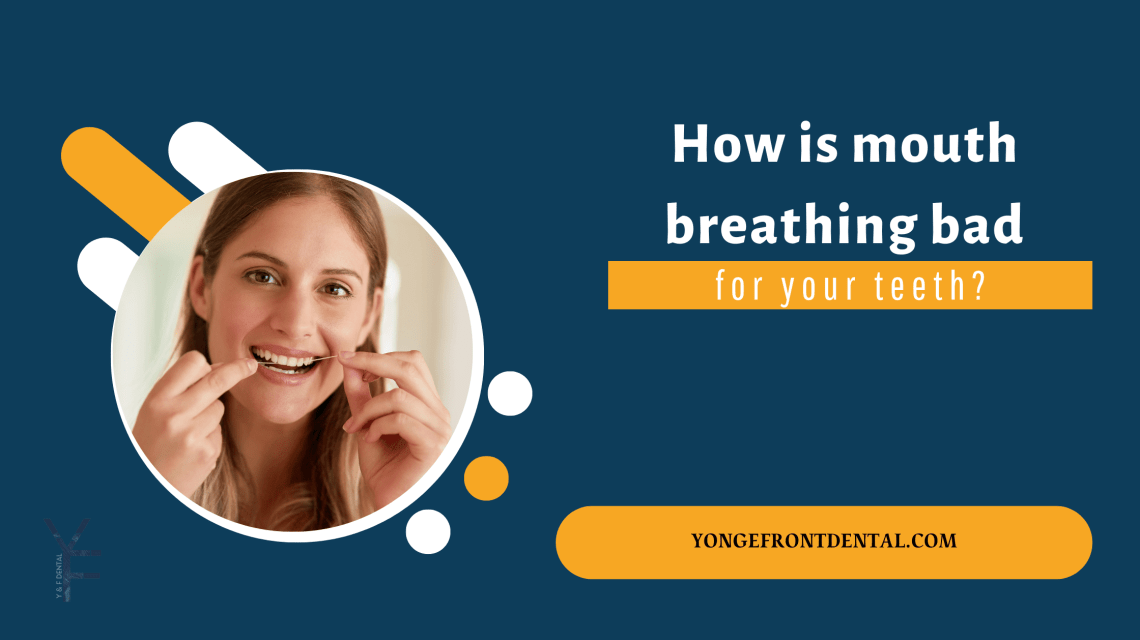Breathing is something we do unconsciously every second of the day, but the way we breathe can have a significant impact on our health. Most people assume that as long as air is flowing in and out, everything is fine. However, breathing through the mouth instead of the nosecan lead to a range of dental and health issues.
Many individuals are unaware of the effects mouth breathing can have on their teeth, gums, and overall oral health. From causing dry mouth to increasing the risk of cavities and gum disease, the consequences can be long-lasting if left unaddressed.
Understanding why mouth breathing occurs, how it affects the oral cavity, and what steps can be taken to prevent damage is essential for maintaining a healthy smile and strong teeth.
What Causes Mouth Breathing?
Mouth breathing can develop due to temporary issueslike a cold or chronic conditionsthat prevent normal nasal breathing. Some of the most common causes include:
1. Nasal Congestion and Allergies
- Blocked nasal passages force individuals to breathe through their mouths.
- Common triggers include dust, pollen, pet dander, and sinus infections.
2. Enlarged Tonsils or Adenoids
- Swollen tonsils or adenoids restrict airflow through the nose, especially in children.
- This can lead to habitual mouth breathing, particularly during sleep.
3. Structural Issues
- A deviated septum, narrow nasal passages, or jaw abnormalities may limit proper airflow.
- Some individuals may have small nasal openingsdue to genetics or developmental factors.
4. Habitual Behavior
- Some people develop a habit of breathing through their mouths due to poor postureor a long history of nasal obstruction.
- This behavior often goes unnoticed until dental problems arise.

The Impact of Mouth Breathing on Teeth and Gums
Breathing through the mouth affects saliva production, bacterial balance, and the alignment of teeth, leading to several dental complications.
1. Dry Mouth (Xerostomia) and Increased Bacteria
Saliva plays a critical role in protecting teeth from decayand washing away harmful bacteria. When the mouth remains open for long periods, saliva evaporates quickly, resulting in:
- A dry, sticky feeling inside the mouth.
- A higher concentration of bacteria, increasing the risk of plaque buildup.
- An environment where tooth decay progresses fasterdue to a lack of natural remineralization from saliva.
Individuals who experience dry mouth frequently may also struggle with bad breathand an unpleasant taste in their mouth.
2. Higher Risk of Cavities
A well-hydrated mouth helps neutralize acids that erode tooth enamel. When saliva levels drop, acids from food, drinks, and bacteria remain on the teeth longer, leading to:
- Increased tooth sensitivity.
- More frequent cavity formation.
- Faster deterioration of tooth enamel, making teeth weaker and more susceptible to damage.
Children who breathe through their mouths while sleeping often develop more cavitiesthan those who breathe through their noses.
3. Gum Inflammation and Periodontal Disease
Saliva contains antibacterial propertiesthat help maintain healthy gums. Without enough saliva, gums can become:
- Irritated and inflamed, leading to early-stage gum disease (gingivitis).
- More vulnerable to advanced periodontal disease, which can cause gum recession and tooth loss.
Mouth breathers are also more likely to experience red, swollen, or bleeding gums, especially along the gum line.
4. Misalignment of Teeth and Jaw Development Issues
When children consistently breathe through their mouths, it can affect the development of their facial structure. The constant downward positioning of the tongue can lead to:
- A narrower jaw, resulting in crowded or misaligned teeth.
- An overbite or underbite, which may require orthodontic treatmentlater in life.
- A longer face shapedue to improper tongue posture and jaw positioning.
Orthodontists often observe significant changes in jaw structureamong individuals who have been mouth breathers since childhood.
5. Bad Breath (Halitosis)
Persistent mouth breathing contributes to chronic bad breath. The combination of dry mouth and bacterial buildupcreates an environment where odor-causing bacteria thrive.
Individuals who struggle with morning breathmay notice their symptoms worsen if they breathe through their mouths at night.

Other Health Concerns Linked to Mouth Breathing
Beyond dental problems, mouth breathing can impact overall healthin several ways:
- Poor Sleep Quality:Mouth breathers often wake up feeling tired and groggydue to disrupted oxygen intake.
- Increased Risk of Respiratory Infections:The nose filters and humidifies air before it reaches the lungs, while the mouth does not.
- Facial Structure Changes in Children:Consistent mouth breathing may contribute to a recessed chin or longer facial profile.
Addressing the problem early can prevent long-term dental and health complications.
How to Prevent and Correct Mouth Breathing
While some causes of mouth breathing may require medical intervention, there are several ways to reduce its impacton oral health.
1. Identify and Treat the Underlying Cause
- Consult a dentist or an ENT specialistto determine if nasal congestion, tonsil enlargement, or structural issues are responsible.
- If allergies are the cause, try antihistamines, nasal sprays, or allergy treatmentsto clear airways.
2. Practice Nasal Breathing Exercises
- Breathing techniquessuch as the Buteyko method can help strengthen nasal breathing.
- Focus on keeping the tongue positioned at the roof of the mouthto encourage nasal airflow.
3. Use a Humidifier at Night
- Keeping air moistprevents excessive dryness and helps maintain saliva production.
- This is especially useful for individuals who breathe through their mouths while sleeping.
4. Improve Oral Hygiene
- Brush and floss twice dailyto reduce bacterial buildup.
- Stay hydrated and consider using an alcohol-free mouthwashto prevent dry mouth.
- Visit the dentist regularlyfor professional cleanings and checkups.
5. Seek Orthodontic Treatment if Necessary
- Braces, expanders, or clear alignerscan help correct alignment issues caused by mouth breathing.
- Some cases may require myofunctional therapyto improve tongue and jaw posture.
Taking proactive steps can protect teeth from decay and ensure long-term oral health.

Final Thoughts
Mouth breathing is more than just an occasional inconvenience—it can lead to serious dental problemslike dry mouth, cavities, gum disease, and even changes in facial structure. Many people are unaware of its effects until they experience persistent oral health issues.
By recognizing the signs early and taking preventive measures, individuals can avoid long-term dental complications. Whether it’s addressing nasal congestion, improving oral hygiene, or seeking orthodontic care, small changes can make a big difference in maintaining a healthy and well-aligned smile.
If you suspect that mouth breathing is affecting your dental health, consider speaking to a dentist or healthcare professionalfor personalized advice and treatment options.


